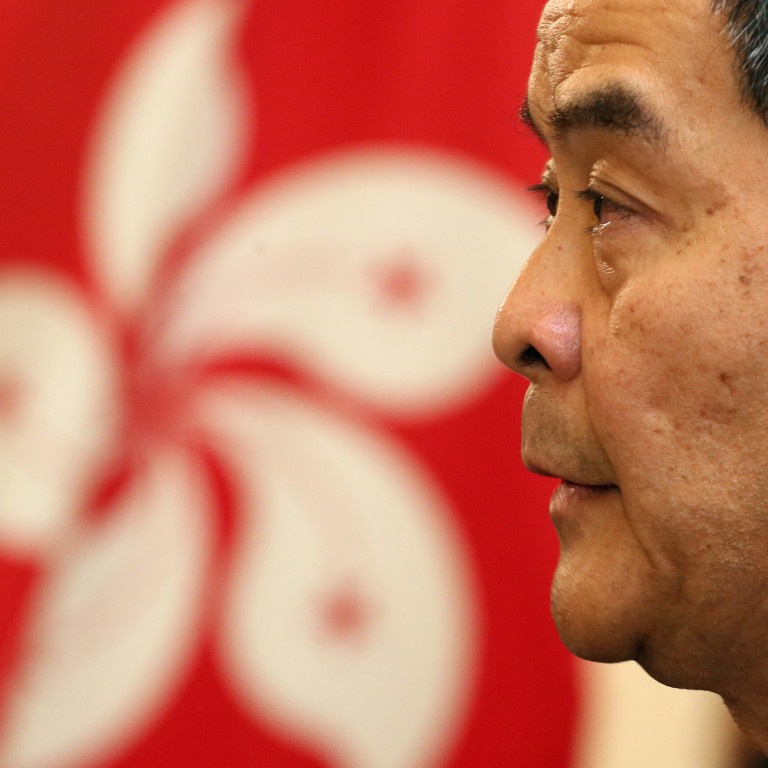
Time for Beijing to be creative, and ensure Leung doesn't get second term
Suzanne Pepper says adopting public recommendation idea can also help break the impasse
There are ways out of Hong Kong's current impasse over political reform if only the principals can indulge in some creative political thinking. Beijing does not need to back down, as student protesters have demanded. It just needs to move forward, and the way forward lies in two directions.
One is that Chief Executive Leung Chun-ying should not serve a second term; the other is that public recommendation can serve as a substitute for public nomination.
First, the Leung problem. Nothing has been said officially about who Beijing wants to stand as its preferred candidate in the 2017 election. Local loyalist partisans have not been shy about voicing what they assume to be Beijing's intentions. Beijing is, they say, exceedingly chagrined over the failure of all three post-1997 chief executives to establish the authority needed to govern properly. With their constant carping and agitation, pro-democracy forces have succeeded in discrediting all of Beijing's choices.
Officials have yet to grasp that their ways do not sit well with the Hong Kong public as a whole and that stable, effective governance here must be based on some approximation of the consent of the governed ideal. So be it. This can be a learning experience for Beijing as well because its current thinking about how to establish that consent cannot work.
Beijing's idea is to have the nominating committee nominate Leung. Voters would then rubber-stamp his election as the leading candidate with the advantage of incumbency. That would, as Beijing sees it, create a chief executive legitimised and strengthened by Hong Kong's first ever universal suffrage election.
This is nice in theory, but based on a formalistic view of how democratic authority is established.
After the debacle of the current electoral reform exercise, it is probably safe to assume that Leung will not be receiving many votes from the 50-plus per cent of the voting public that has continued to elect pro-democracy candidates. These voters do so because their candidates back pro-democracy core values, not necessarily because people have any great faith in pan-democrats' political skills or abilities - which means these voters care most about those values and want to safeguard them.
Hence, the first thing Beijing might do is not - as protesters have been demanding - force Leung to resign now. All Beijing needs to do is ensure all talk of a second term for Leung is laid to rest, and the sooner the better. The talk has circulated among political activists on all sides. But since nothing has been said officially concerning their bright idea, Beijing officials need not worry about the embarrassment of losing political "face" and the legitimacy they think comes with it by backing down on a stated position.
Depriving Leung of a second term will open up the candidate field; the second most powerful man responsible for Hong Kong decision-making in Beijing, Zhang Dejiang , had something relevant to say a few weeks ago. He told Hong Kong visitors that, although the August 31 decision specified the candidate must be patriotic, it did not necessarily mean only a devout pro-communist loyalist could qualify.
The person did not have to "love" - meaning profess loyalty to - the Communist Party. Candidates must only not be among those who advocate an end to one-party dictatorship in China. It leaves the way open for pan-democrats to start organising their own primary campaign, just as they have been informally organising political reform proposals over the past year, when the idea of public nomination caught people's imagination.
The public could simply nominate their own preferred candidates via mock referendums and primaries.
Then it would be up to Beijing and its nominating committee stalwarts to find their way out of the impasse they have created for themselves.
Some judicious redesigning of the inherited committee would be a good place to begin. But even better would be to formally adopt the public recommendation idea advanced prominently by 18 academics at the end of last spring's public consultation exercise.
This is the only proposal from the public that Chief Secretary Carrie Lam Cheng Yuet-ngor did not veto. She did so for all the others on grounds that they violated Hong Kong's constitutional Basic Law requirements as defined by Beijing. Hence Beijing need only authorise the nominating committee to consider pan-democrats' informally "recommended" candidates.
The beauty of these two possibilities is they could be accomplished while leaving intact the August 31 decision. Beijing now says it is written in stone and cannot be changed. But officials don't need to back down. They need only begin thinking more creatively about institution-building and citizenship in a country with two different political systems. One-size-fits-all will probably never work smoothly here, but it certainly cannot work now.
